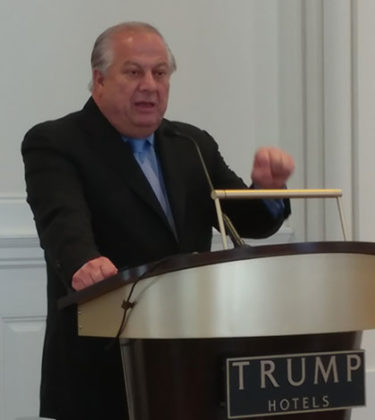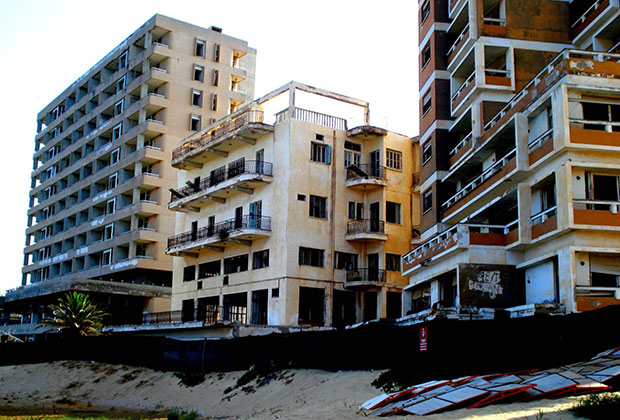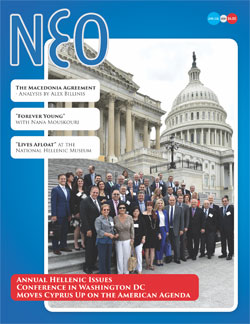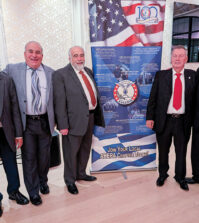Philip Christopher on the upcoming Hellenic Issues Conference and the East Mediterranean Partnership

“Now we have to focus on the EMP (East Mediterranean Partnership) of Greece, Cyprus, and Israel,” says Philip Christopher, president of PSEKA
Philip Christopher is one of those individuals whose contributions more resemble an institution than the force and spirit of one man. His outside role in seeking justice for Cyprus, that “gold and green leaf in the sea,” has often been a lonely one, as Cyprus was generally relegated to a secondary issue. Philip Christopher is President of the International Coordinating Committee “Justice for Cyprus,” (PSEKA) an international organization founded by the late Cypriot President Archbishop Makarios in 1975. Its North American headquarters are in New York City. Since its founding, the committee’s goal has been Justice for Cyprus and Cypriots—all Cypriots. Besides grass roots work, coordinating and lobbying, PSEKA organizes for the past 35 years a two day conference in the nation’s capital where participants meet with top-level Congressional and administration officials who formulate U.S. policy toward Cyprus, Greece and Turkey. Typically, the group meets with over 40 key U.S. Senators and Members of Congress who serve on the pertinent committees and subcommittees, and others, who play a major role in policy. The 35th Annual PSEKA Cyprus Conference will be held in June 4-6 at The Ritz-Carlton, Washington D.C. This July will mark 45 years that Cyprus remains partially occupied, and Nicosia has the tragic fortune to be the only divided capital in Europe. There have been many false dawns over four and a half decades yet change may be in the air.
Much of this has to do with the efforts of the Cypriots themselves. Faced with an existential threat they managed not only to survive, but to prosper. Using both their proximity to the Middle East and their Orthodox connections, the Cypriots were doing business everywhere, and while the tourist gem of Famagusta is still a decaying ghost town with pristine, barbed wired beaches, elsewhere the hospitality and beauty of Cyprus is a massive draw for holidaymakers. Cyprus was hit hard by the Euro Banking Crisis of the 2013 but took the bull by the horns and bailed itself out by bailing in and is now running along smoothly. Cyprus is a success story against overwhelming odds.
Now, the tectonic plates of geopolitics may be shifting in the ancient island’s favor. Erdogan’s Islamist and xenophobic regime has alienated Israel and increasingly the United States, while at the same time Greece and Cyprus forged links with Israel, and in the Diaspora, Greeks and Jews started to see that their interests coincided.
I had a chance to talk with Philip Christopher about the upcoming 35th Annual PSEKA Conference, and where he feels that things are going.
Christopher is refreshingly laconic in his discussions. Like most conversations between Greeks, we both spoke a bit about our backgrounds, and then we quickly moved to the subject, his passion for the cause balanced by the day to day demands of a successful businessman. For the past 44 years, his aims have been consistent and simple: to remove the Turkish occupation forces from Cyprus, to reunite the island, and for refugees (including his own family) to return home.
The damage done by the Turks, he is quick to say is irreparable, with over 500 churches, some of great historic and spiritual antiquity, destroyed, and the demographics irretrievably altered by the importation of 500,000 mainland Turkish “colonists.”

The “ghost town” of Famagusta. The Turkish occupying authorities still don’t allow its inhabitants to return to their homes
While he is a Greek Cypriot with a focus on his own community, he reminds me that the Turkish Cypriot community has been deeply damaged by Cyprus’ division and the mainland Turkish colonization. So many Turkish Cypriots have fled abroad, and “over 100,000 Turkish Cypriots have taken passports issued by the Republic of Cyprus,” an indictment of the Turkish occupation and the illegal Turkish Cypriot regime. “Turkish Cypriot culture was secular, and they got along with their Greek neighbors,” but the Turkish regime has imported fundamentalists at odds with Turkish Cypriot mentality. His words only confirmed what I had heard when I lived in London, home to a huge Cypriot community (Greek and Turkish). Greek and Turkish Cypriots often live in the same neighborhoods, and they have recreated some of the intercommunal spirit that existed among Cypriots, in spite of tensions.
PSEKA has been reminding their fellow Greeks and US policymakers that Turkey, an ostensible NATO ally, violated US law when using American-purchased weaponry to invade Cyprus in 1974, and has essentially blackmailed the NATO ever since by touting its strategic position, its military strength, and its status as a secular Muslim democracy. “As American citizens, we should all be concerned about this.”

Group photo of the participants in the 34th PSEKA Conference and NEO’s cover in July 2018
Erdogan’s attacks on Israel, and his increasing fundamentalism, and open challenge of the United States has changed the game. Given the change in Turkey, Greece and Cyprus grew closer to Israel, which Christopher applauds, “it is normal that the three true democracies in the Eastern Mediterranean should be aligned,” and this alignment is growing, in political, economic, military, and energy terms—with the apparent blessing of the United States.
“Now we have to focus on the EMP (East Mediterranean Partnership) of Greece, Cyprus, and Israel. [Secretary of State] Pompeo’s attendance at a recent EMP meeting in Jerusalem was crucial,” Christopher adds, though he warns, from his years of experience, that “Turkey may, at the last minute, [shift course] and try to gain concessions, such as dropping Cyprus.” They have done it before, and Christopher emphasizes that it is crucial to build awareness within the Congress as to the true nature of Turkey.
Another key issue for PSEKA is lifting the arms embargo on Cyprus, so that the Cypriots can purchase American weaponry for self-defense. It is astonishing that the arms embargo against Turkey was lifted in 1978 on condition that Turkey withdraw from Cyprus, which it never has, but the victim state, Cyprus, continues to suffer from an American arms embargo. The chairman of the House Foreign Relations Human Rights subcommittee put it simply and correctly, “The United States should end its outdated arms embargo on Cyprus.” Here too, the efforts of PSEKA, other Greek organizations, and American Jewish interests are starting to make an impact.
Despite positive events, the road ahead remains difficult. Turkey has former generals and representatives as paid lobbyists; the Turks know the Washington game quite well. Christopher is very candid when he says that, “Traditionally, Greece and the Republic of Cyprus have never had an understanding of how the American political system works.” The Turks know who to hire, and they spend money endowing chairs at universities and donating to institutions. Notwithstanding Erdogan’s antics, and Turkey’s abysmal record as an ally, there are plenty of very influential people who have been well compensated to advocate for Turkey. This is why continued citizen advocacy and working with the American Jewish organizations is absolutely crucial.

Nicosia, the last divided capital city in the world
While his heart aches for justice for his native island, Christopher emphasized that PSEKA is a movement of and by American citizens. “The invasion of Cyprus was a violation of American law,” and PSEKA demands that American law be applied, simple as that. “We do not allow [Cypriot] political parties into the discussion.” While he agreed that Cypriots had done a great deal to help themselves—“a good economy is good foreign policy”—he is quick to point out past mistakes or misguided alignments. A strong partnership with Greece and Cyprus is good for America, because both these countries are democracies with values similar to America’s. Greece’s record in both World Wars in a perfect example—a staunch American ally. Not so Turkey.
The current regional alignments—Cyprus, Greece, and Israel—and the outreach to Middle Eastern states such as Egypt and Jordan are smart foreign and economic policy for all concerned, and clearly, Washington has taken notice. Strategic, economic, and political forces are combining several Eastern Mediterranean countries into an effective partnership for regional cooperation and containment of Turkey. The United States is clearly seeing the value of such a partnership. The goal of all Diaspora Greeks here in this country is to continue to work on building such a coalition that is beneficial to American foreign policy and the rule of law. Cyprus lies at the core of this activity, and a just solution to the Cypriot tragedy is key for the success of the entire region.
The conference this year should be interesting, as Cyprus has shifted from the periphery to the center. Watch this space.















0 comments